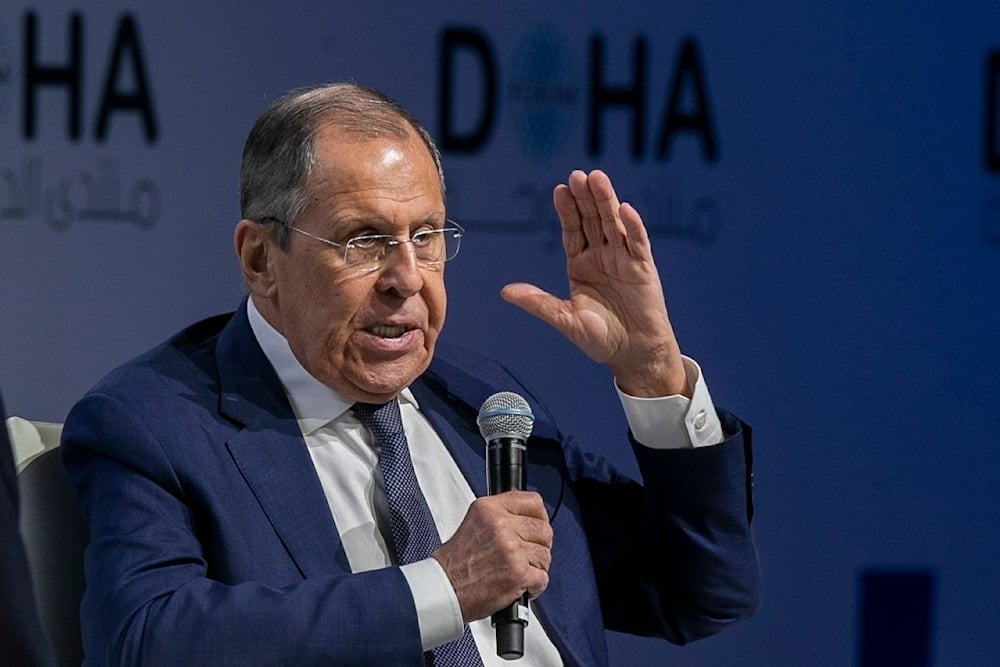Lavrov says US aims to prolong war in Ukraine, discusses Syria & more
In an exclusive interview with Sputnik, Russian Foreign Minister Sergey Lavrov discusses the Ukraine crisis, military presence in Syria, and Russia's relations with the US and Iran.
-

Russian Foreign Minister Sergey Lavrov gestures as he speaks at the Doha Forum in Doha, Qatar, on December 7, 2024. (AP)
Russian Foreign Minister Sergey Lavrov stated that Moscow is open to negotiations on resolving the Ukraine crisis, emphasizing that talks must address the root causes and reflect the realities "on the ground."
In an exclusive interview with Sputnik, Lavrov stated that both the outgoing and incoming US administrations possess the means to initiate negotiations between Moscow and Kiev, exposing how Washington does not actually intend to end the war.
"If Washington really wanted to end the conflict, it would have stopped supplying weapons to Kiev, demanded that their satellites do the same, and ordered their Kiev puppets to cease fire, resume the negotiation process without any conditions," he told Sputnik.
He also mentioned that Russia's approaches to resolving the conflict were previously defined by President Vladimir Putin on multiple occasions, highlighting that Moscow's main objectives are the "demilitarization and denazification of Ukraine, ensuring its non-aligned, neutral and nuclear-weapon-free status, and eliminating long-term threats to Russia's security emanating from the West, including the expansion of NATO."
Moreover, Ukraine must ensure the rights and freedom of Russian-speaking citizens, as well as acknowledge Russia's territorial realities.
Lavrov stated that discussions in Kiev and the West about a ceasefire in Ukraine aim to buy time to bolster the Ukrainian Armed Forces for renewed conflict, implying that the recent F-16 fighter jet provisions from Denmark to Ukraine were further proof of recent escalations, prompting counter-measures from Russia.
On Syria and ties with Iran
The top Russian diplomat also discussed the matter of Russian military presence in Syria, particularly in light of the domestic developments, most notably the fall of the Assad regime.
According to Lavrov, Moscow has not been informed of any plans by Syria's new authorities to revise agreements on Russian military bases. He emphasized that no requests regarding this matter have been received from Damascus.
Lavrov acknowledged Syria's sovereignty and right to amend agreements but noted that the declared "transitional period" until March 1, 2025, likely explains the lack of action, adding that while changes in Syria's leadership and situation may influence the Russian military presence, any adjustments would require negotiations with the new Syrian leadership.
Moreover, the situation in Syria does not impact the comprehensive agreement established between Russia and Iran, the foreign minister affirmed, adding that it was ready to be signed and officiated.
He described the agreement as comprehensive, long-term, and adaptable to all circumstances, requiring no amendments despite the change in Syrian leadership. Lavrov highlighted that the agreement reflects significant progress in bilateral relations and elevates them to the level of a strategic partnership.
Russia, NATO, and the US
Lavrov also warned that the US and NATO would face decisive military-technical countermeasures if they create new missile threats against Russia, emphasizing the country's readiness for any scenario and the importance of reducing conflict.
While arms control could be discussed, Lavrov stressed it would only be part of a broader agenda. He noted that Russia's moratorium on deploying intermediate-range missiles is nearing its end due to US actions but remains in force for now.
Lavrov additionally criticized the US for deploying such weapons globally, prompting Russia to prepare proportional responses, stressing the successful testing of the Oreshnik system as evidence of Russia's capabilities.
Moreover, Russia remains committed to maintaining predictability in the missile and nuclear sphere despite strained relations with the US. He denounced the US' underestimation of strategic stability and declared that no arms control negotiations would occur unless Washington abandons its "anti-Russian" policies.
Lavrov noted that Russia continues to voluntarily adhere to measures such as the quantitative limits of the New START treaty and a unilateral moratorium on deploying ground-based medium- and shorter-range missiles. He reiterated that while Russia is taking steps to ensure stability, dialogue with the US on arms control is currently off the table.
Russia's nuclear strategy
In a related context, Lavrov stressed that Russia's nuclear supply fully adheres to the charters of the New START treaty, even when its effectiveness was suspended. However, the restrictions outlined by the treaty could be rendered "meaningless" to Russia based on the US' actions.
He told Sputnik it is too early to speculate about the period following the expiration of the New START treaty in February 2026, emphasizing that much could change within a year, further noting that Russia continues to comply with the treaty's quantitative limits despite its suspension.
Earlier this week, Arms Control Association (ACA) Executive Director Daryl Kimball told RIA Novosti that US President-elect Donald Trump and Russian President Vladimir Putin might discuss options for mutual nuclear restrictions during their upcoming interaction.
According to Kimball, neither leader has presented a plan regarding Russia's strategic arsenal, but discussions regarding Ukraine are expected to take place during the presidents' upcoming interaction, while discussions for nuclear restrictions could potentially arise, particularly after the expiration of New START.
The ACA chief further stressed the importance of establishing nuclear constraints, adding that "While trust may be at an all-time low, that is all the more reason for the two sides to avoid unconstrained strategic nuclear competition now or in the future."

 5 Min Read
5 Min Read









